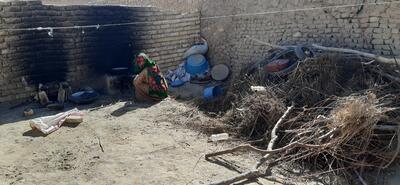Children sleeping outside without proper winter clothing face freezing conditions that could lead to illness or death.

Abdel*, 45, lives in Faryab province, Afghanistan, with his wife and four children. Their home lacks doors and the windows are broken, but they are unable to repair them due to their financial situation.
Nearly 800,000 children in Afghanistan face a freezing winter without proper shelter, according to an analysis by Save the Children.
Household surveys conducted by the UN found that around 1.6 million people are living in emergency tents or makeshift shelters – often no more than flimsy plastic sheets held up with sticks – which offer little protection from rain, snow and sub-zero temperatures.
In addition, nearly 8.6 million children live in households that do not have enough blankets to go around, and more than 3 million children do not have adequate heating to keep them warm.
Already, some children are reported to have starved as soaring food prices leave families struggling to afford them, and 5 million children are said to be one step away from famine.
Thomas Howells, acting Country Director for Save the Children in Afghanistan, said: “With the country facing its worst hunger crisis ever recorded, millions of children will be going to sleep cold and hungry this winter. The shocking reports of children starving to death should make us all feel ashamed.”
Winter temperatures in Afghanistan plummet to as low as -12.1 degrees centigrade in some provinces. Children sleeping outside without proper winter clothing or heating are at serious risk from hypothermia, acute respiratory infections like pneumonia and, in the worst cases, death, Save the Children said.
Some 25-30% of deaths in children under five in Afghanistan are due to respiratory tract infections – and 90% of these are due to pneumonia. Save the Children warned that more deaths can be expected this winter in a worsening humanitarian crisis.
Price hikes and the collapse of the economy have pushed many families into dangerous territory, Save the Children warned, with many unable to afford fuel or firewood to heat their homes. Fuel costs have risen by around 40% over the past year, and enough firewood to last a family through the winter costs around US$200.
Many families resort to burning plastic or other harmful materials to keep warm, which increases the risk to children’s health in winter months.
Narges*, 27 lives with her husband and their six children in Kandahar Province. The family are living in a tent which offers little protection from the cold and rain. Narges* said:
“I am worried about the coming winter; we live in an old tent and we won’t be able to protect ourselves from the rain in the winter. I cannot afford enough food to feed my children and keep them warm. I’m worried about how I’ll keep my children safe from the cold, and how we will survive. At night my children get so cold, but we cannot afford to buy wood to burn and heat our tent.”
Mirza*, a labourer, lives with his wife and their seven children in Faryab province. They were displaced from their home this year after their home was damaged in the conflict and they could not afford the repairs. They are now living in a rented house in another town. Mirza* said:
“Winter will be difficult this year. We need food stocks, warm clothing for the children and a warm home which is not possible for me and my family. We are worried about our children and their health – my smallest child is less than one year old.
“The price of food is rising and I can’t find work most days. We are trying to cope, but it’s very difficult. I’ve had to borrow about 30,000 AFN (US$330) from my relatives and shopkeepers.
“We need gas and wood for heating and cooking, but the cost will be almost 8000 AFN ($88) for the winter, which I can’t afford. If I can’t earn money I will have to borrow to buy the things we need. I will have to send my younger children to find paper and wood from the road, and then we will burn them during the winter.”
Winter in Afghanistan is also a peak hunger season, and this winter the country is expected to face its worst food crisis since records began. In October, analysis by Save the Children found that more than 14 million children are expected to go hungry this winter, with 5 million just one step away from famine.
Thomas Howells, acting Country Director for Save the Children in Afghanistan, said:
“Even under normal circumstances, the bitter Afghan winter is a desperate fight to survive for many families, but this year, the need will be greater than ever.
“Thousands of families are living in displacement camps, where a plastic sheet is often all that separates them from the freezing winter temperatures. Small children sleeping outside in tents without warm clothing, blankets or heating stand absolutely no chance in these sub-zero conditions. It’s only a matter of time before they succumb to hypothermia, pneumonia or, in the worst cases, death.
“We’re doing everything we can to get families the essentials they need to survive the winter – blankets, warm clothes and fuel to keep warm. But more aid is desperately needed, and needed now before the winter gets worse.”
Save the Children will support more than 26,000 families in nine of the hardest-hit provinces this winter. Families will receive winter kits containing blankets and winter clothes for children including coats, socks, shoes and hats. The organisation will also provide families with US$200 to buy a heater and three-month supply of firewood or one gas stove and fuel to last the winter.
*Name changed to protect identity
